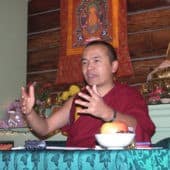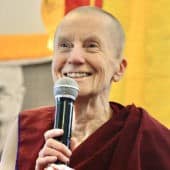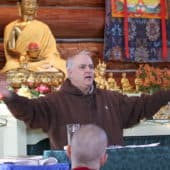Gelugpa teachings offer a framework for understanding the nature of reality that progresses from gross to the most subtle. The purpose of this intricate and systematic presentation is to cultivate a mind able to investigate appearances and determine how they really exist.
Teachings highlighted in bold are listed at the bottom of the page.
Who it’s for
These teachings will appeal to those interested in the philosophical presentation of how to understand reality according to Buddhist scriptures, a presentation that places emphasis on the wisdom side of the path. Wisdom teachings examine how to realize emptiness and dependent arising. Here that approach is presented according to each of the four different Buddhist tenet systems: Vaibashika (Great Exposition), Sautantrika (Sutra), Cittamatra (Mind-Only) and Madhyamika (Middle Way).
Teachers, content, and resources
Geshe Dorji Damdul
Geshe Dorji Damdul, a distinguished Buddhist scholar with a particular interest in the relationship between science and Buddhism, taught at Sravasti Abbey in 2008 on the root text Presentation of Tenets, written by Gon-chok-jik-may-wang-bo: Tenets with Geshe Droji Damdul (2008)
This series of teachings covers such topics as:
- An explanation of the four tenet systems
- Karma, impermanence, and cognition
- Emptiness and impermanence
- Persons, perceptions, and mental factors
- Conventional and ultimate truths
- Cultivating bodhicitta
- Buddhism, science, and mind
Geshe Dadul Namgyal
Senior Resident Teacher at Drepung Loseling Monastery in Atlanta and part of the Emory University Emory-Tibet Partnership, Geshe Dadul taught the Madhyamaka Through Metaphors course over three years (2015-2017).
Using metaphors from Buddhist scriptures, Geshe Dadul brings to life the teachings on how to understand the ultimate nature of reality according to the highest tenet system, Prasangika Madhyamika.
This 27-part series covers such topics as:
- Explaining the Madhyamaka view
- Coming to the right understanding of emptiness
- Identifying the object of negation
- Meditations on identifying the self and space-like emptiness
- Types of dependent origination
- The determination to be free and cultivating bodhicitta
In 2020, Geshe Tenzin Chodrak (Dadul Namgyal) offered teachings on this topic at Sravasti Abbey: Tenets with Geshe Tenzin Chodrak (Dadul Namgyal) (2020)
The full playlist of Geshe Dadul’s teachings on this topic are available on the Abbey’s YouTube page here.
Dr. Guy Newland
Dr. Guy Newland, a scholar of Tibetan Buddhism at Central Michigan University, has taught two series on tenets at Sravasti Abbey.
In 2011, he offered teachings on Madhyamaka: Varieties of Madhyamaka with Guy Newland (2011) . Topics he covered include:
-
- The variety of perspectives on Madhyamaka
- How the teachings of the different Tibetan Buddhist lineages relate to Madhyamaka
- Practical applications of studying philosophy
- Approaching and coping with diversity
The full playlist for these teachings is available on the Abbey’s YouTube page here.
In 2010, Dr. Newland gave teachings on the two truths, that is, conventional and ultimate truths: Two Truths with Guy Newland (2010) . This set of teachings covers such topics as:
-
- What are the two truths?
- The two truths and karma
- The two truths according to the four Buddhist tenet systems
- Understanding the mind, emptiness, and dependent arising
- Debates on coming to the correct conclusion about the nature of reality
The full playlist for these teachings is available on the Abbey’s YouTube page here.
Venerable Sangye Khadro
Venerable Sangye Khadro, author of the best-selling How to Meditate, has taught several courses at Sravasti Abbey, including an exploration of The Presentation of Tenets by Jetsun Chokyi Gyaltsen (1469–1544): Tenets with Venerable Sangye Khadro (2022).
Topics include:
- The philosophical assertions of the Vaibhashika school including the view of the two truths
- The Sautrantika school and the mode of asserting objects including conventional and ultimate truths
- The Mind-only or Cittamatra school including views on the two truths and the three natures
- The Svatantrika Madhyamaka assertions
- Explanation of the Prasangika assertions about the mind and the selflessness of persons and phenomena
Related Series

Madhyamaka through Metaphors with Geshe Tenzin Chodrak (Dadul Namgyal) (2015-17)
Teachings by Geshe Tenzin Chodrak (Damdul Namgyal) on Middle Way philosophy given at Sravasti Abbey.
View Series
Tenets with Geshe Dorji Damdul (2008)
Geshe Dorji Damdul teaches on the tenet systems in Tibetan Buddhist philosophy, a presentation of different schools of thought on Buddhis...
View Series
Tenets with Geshe Tenzin Chodrak (Dadul Namgyal) (2020)
Teachings on Buddhist tenet systems by Geshe Tenzin Chodrak (Dadul Namgyal) given at Sravasti Abbey in 2020, with reviews by Venerables T...
View Series
Tenets with Venerable Sangye Khadro (2022)
Weekly teachings on the text "Presentation of Tenets" by Jetsun Chokyi Gyaltsen by Venerable Sangye Khadro.
View Series
Two Truths with Guy Newland (2010)
Dr. Guy Newland teaches how different Tibetan Buddhist schools of philosophy explain conventional and ultimate truths in order to underst...
View Series
Varieties of Madhyamaka with Guy Newland (2011)
Teachings by Dr. Guy Newland on the varieties of Madhyamaka according to different schools of Tibetan Buddhism, given at Sravasti Abbey i...
View Series
Buddhist Tenet Systems
The Gelugpa framework for understanding the nature of reality.